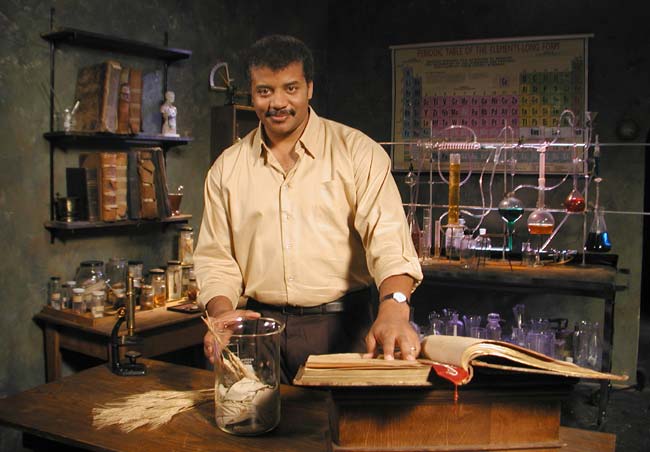TV Review: NOVA - Origins

Providing television viewers a solid primer on everything from the birth of the universe to the variety of life in New York City's Times Square may seem like a daunting prospect, but a new miniseries to appear on the Public Broadcasting Service (PBS) succeeds in its attempt.
It seems four is the magic number for NOVA: Origins (PBS, Sept. 28-29 at 8:00 p.m. EDT), a four-hour, four-part series that producer say was four years in the making. Each hour tackles a different area of cosmic evolution, starting with the formation of the Earth and planets, then leading onward to the rise of life, the search for extraterrestrial lifeforms and the beginning of the universe.
Hosting the series is astrophysicist Neil deGrasse Tyson, director of the Hayden Planetarium at the American Museum of Natural History (AMNH) in New York City.
"[Origins] addresses questions that have been with us since the beginning of culture," deGrasse Tyson said during a Sept. 22 preview at the American Museum of Natural History in New York City. "And that is: How did it all get here, and are we alone?"
Taken as a whole, the Origins series offers a clear window into current astronomical research form even the most diehard non-scientist using practicing researchers, animations and analogies as guides. The diversity of life, the series demonstrates, runs from tiny microbes to Times Square's Naked Cowboy. Researchers are found probing the universe atop the Chilean mountains and traipsing deep within the Earth for hardy microorganisms.
"We tried to make this as accessible as possible," Origins executive producer Tom Levinson, stressing that he hopes viewers see their direct connection with the lives of stars, which provided the material that led to the solar system, Earth and humans. "We wanted to ground our series in the work of scientists doing active investigations."
Origins producers save their most science-heavy subject, the concept of the Big Bang and the discovery of the cosmic microwave background, for last, which can be trying for some viewers. But the focus on practicing astronomers, especially a pair of researchers who stumble onto the cosmic microwave background after sweeping pigeon poop from the insides of their telescope, keep the pace moving.
Breaking space news, the latest updates on rocket launches, skywatching events and more!
NOVA: Origins will appear on PBS on Sept. 28-29 at 8:00 p.m. EDT. (Check local listings).

Tariq is the award-winning Editor-in-Chief of Space.com and joined the team in 2001. He covers human spaceflight, as well as skywatching and entertainment. He became Space.com's Editor-in-Chief in 2019. Before joining Space.com, Tariq was a staff reporter for The Los Angeles Times covering education and city beats in La Habra, Fullerton and Huntington Beach. He's a recipient of the 2022 Harry Kolcum Award for excellence in space reporting and the 2025 Space Pioneer Award from the National Space Society. He is an Eagle Scout and Space Camp alum with journalism degrees from the USC and NYU. You can find Tariq at Space.com and as the co-host to the This Week In Space podcast on the TWiT network. To see his latest project, you can follow Tariq on Twitter @tariqjmalik.
